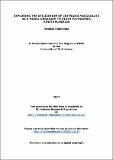Exploring the utilization of Crithidia fasciculata as a model organism to study pathogenic kinetoplastids
Abstract
This study aimed to explore the utilization of C. fasciculata as a convenient model organism to study the cell biology and drug discovery vehicle of the pathogenic kinetoplastids. We specifically aimed to: (i) develop and validate a protein A-TEV-protein C (PTP) tagged protein expression system forC. fasciculata, (ii) develop a Resazurin-reduction viability assay with C.fasciculata and use this for subsequent screening for anti-crithidial compounds from the GSK open access pathogen boxes, and (iii) to study the effects of ionizing gamma radiation on C. fasciculata.
We report the construction of plasmid pNUS-PTPcH, which can be utilised to express PTP tagged kinetoplastids proteins in C.fasciculata for subsequent purification. As a proof of concept, we have shown that C.fasciculata can be efficiently transfected with this plasmid and facilitate the isolation of two protein complexes: replication factor C (RFC) and the exosome. We have demonstrated that the expressed PTP tagged-replication factor C subunit 3 (PTP-RFC3) co-purifies with RFC1, RFC2, RFC4, RFC5 and RAD17, and that the PTP tagged exosome subunit RRP4 co-purifies with RRP6,EAP1, RRP45, RRP40, RRP41B, CSL4, EAP2, RRP41A and EAP4. In addition, this thesis reports the development of a resazurin-reduction cell viability assay in C.fasciculata and reveals attractive core chemical scaffolds present in more than one of the open access GSK pathogen boxes, which will be followed up against the actual pathogenic kinetoplastids. Furthermore, this study has demonstrated that compared to cultured forms of T.cruzi which undergo growth arrest for 96 hours after exposure to 500 Gy of gamma radiation, C.fasciculata is able to recover and resume normal growth within 24 hours after being subjected to doses as high as 1000Gy.
The constructed plasmid, the identified chemical scaffolds and the observed responses of C.fasciculata to gamma irradiation will help facilitate further studies aimed to discover novel drugs for kinetoplastid diseases.
Type
Thesis, MPhil Master of Philosophy
Collections
Items in the St Andrews Research Repository are protected by copyright, with all rights reserved, unless otherwise indicated.

